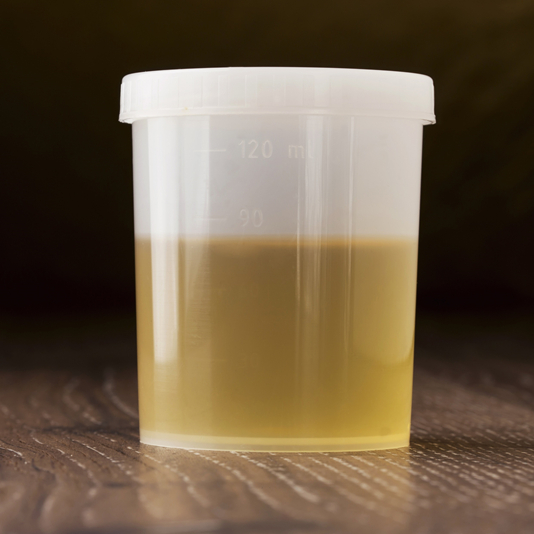
Urine therapy
Alternate names: Amaroli, Auto-Urine Therapy, Auto-Urotherapy, Mutra Paribhasa, Mutra Varga, Naramutra, Shivambu, Uro-Therapy, Urotherapy
Background
Urine therapy refers to the use of urine, usually by mouth, to maintain health.
People use urine therapy for cancer, aging, infections, poisoning, and many other conditions, but there is no good scientific evidence to support these uses.
People use urine therapy for cancer, aging, infections, poisoning, and many other conditions, but there is no good scientific evidence to support these uses.
Safety Safety definitions
When taken by mouth: There isn't enough reliable information to know if urine therapy is safe or what the side effects might be.
When applied to the skin: There isn't enough reliable information to know if urine therapy is safe or what the side effects might be.
When applied to the skin: There isn't enough reliable information to know if urine therapy is safe or what the side effects might be.
Special Precautions & Warnings:
Pregnancy and breast-feeding: There isn't enough reliable information to know if urine therapy is safe to use when pregnant or breast-feeding. Stay on the safe side and avoid use.Effectiveness
NatMed Pro rates effectiveness based on scientific evidence according to the following scale: Effective, Likely Effective, Possibly Effective, Possibly Ineffective, Likely Ineffective, Ineffective, and Insufficient Evidence to Rate.
Insufficient evidence Effectiveness definitions
- Stomach pain.
- Aging.
- Low levels of red blood cells in people with a long-term illness (anemia of chronic disease).
- Male-pattern baldness (androgenic alopecia).
- Eczema (atopic dermatitis).
- Prone to allergies and allergic reactions (atopic disease).
- Asthma.
- Hardening of the arteries (atherosclerosis).
- Burns.
- Cancer.
- Memory and thinking skills (cognitive function).
- Common cold.
- Heart failure and fluid build up in the body (congestive heart failure or CHF).
- Constipation.
- Heart disease.
- Cough.
- Indigestion (dyspepsia).
- Fatigue.
- Fever.
- Gas (flatulence).
- HIV/AIDS.
- High blood pressure.
- Infections.
- Inability to become pregnant within a year of trying to conceive (infertility).
- Flu (influenza).
- Insomnia.
- Leprosy.
- Liver disease.
- Migraine.
- Heart attack.
- A group of symptoms that indicate kidney damage (nephrotic syndrome).
- Ear infection (otitis media).
- Pain.
- Parasites.
- Poisoning.
- Itching.
- Scaly, itchy skin (psoriasis).
- Blood clot in the lungs (pulmonary embolism).
- Painful response to cold especially in the fingers and toes (Raynaud syndrome).
- Rheumatoid arthritis (RA).
- Itchy skin infection caused by mites (scabies).
- Sexual problems that prevent satisfaction during sexual activity.
- Sickle cell disease.
- Toothache.
- Tuberculosis.
- Infections of the kidney, bladder, or urethra (urinary tract infections or UTIs).
- Hives (urticaria).
- Chickenpox (varicella zoster).
- A skin disorder that causes white patches to develop on the skin (vitiligo).
- Wound healing.
- Other conditions.
Dosing & administration
The appropriate dose of urine therapy depends on several factors such as the user's age, health, and several other conditions. At this time there is not enough scientific information to determine an appropriate range of doses for urine therapy. Keep in mind that natural products are not always necessarily safe and dosages can be important. Be sure to follow relevant directions on product labels and consult your pharmacist or physician or other healthcare professional before using.
Interactions with pharmaceuticals
It is not known if this treatment interacts with any medicines. Before using this treatment, talk with your health professional if you take any medications.
Interactions with herbs & supplements
There are no known interactions with herbs and supplements.
Interactions with foods
There are no known interactions with foods.
Action
There isn't enough reliable information available to know how urine therapy might work.
vital.ly has licensed monographs from TRC Healthcare.
This monograph was last reviewed on 30/04/2023 10:00:00 and last updated on 05/11/2020 02:23:33. Monographs are reviewed and/or updated multiple times per month and at least once per year.
Natural Medicines disclaims any responsibility related to medical consequences of using any medical product. Effort is made to ensure that the information contained in this monograph is accurate at the time it was published. Consumers and medical professionals who consult this monograph are cautioned that any medical or product related decision is the sole responsibility of the consumer and/or the health care professional. A legal License Agreement sets limitations on downloading, storing, or printing content from this Database. No reproduction of this monograph or any content from this Database is permitted without written permission from the publisher. It is unlawful to download, store, or distribute content from this site.




